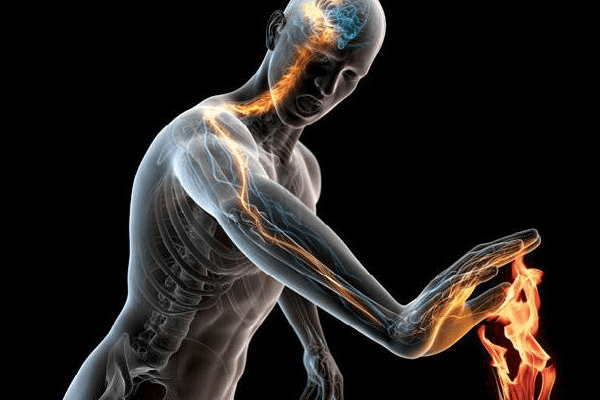Psychology >>>> High pain threshold
High pain threshold.

Tissue sensitivity is the "concern" of the nervous system, or rather the work of peripheral nerve endings, which signal traumatic effects. The brain, receiving signals from peripheral neurons, evaluates their degree of intensity and chooses the appropriate response: be patient, cry, lose consciousness. All of these reactions are a defense mechanism that helps to survive the painful effects.
During the entire period of life, a person (or any other living creature) gets used to pain - forms the pain threshold of sensitivity. An interesting fact is that the same painful sensation, repeatedly experienced, ceases to be acutely perceived - the threshold of sensitivity rises to it. And a one-time painful irritation can be difficult to experience, since at this moment the pain threshold of sensitivity decreases. The nervous system reacts more sharply to unfamiliar levels of irritation - just in case.
It has long been established that living things (humans and animals) experience the same pain sensations in different ways. This is because the nervous system reacts differently to stimulation, has a different degree of sensitivity, determined by the psychophysical state at any given moment in time.
A high threshold of sensitivity (high pain threshold) is the ability to calmly and patiently experience pain sensations in a wide range. People with a high threshold of sensitivity are very patient and resistant to stimuli. A low threshold of sensitivity (low pain threshold) is a very narrow range of pain experience, beyond which the pain becomes unbearable. People with a low pain threshold are very sensitive to minimal pain. The pain threshold is a barrier that separates a person's sensations from the pain factor. The higher the pain threshold, the more difficult it is for pain to break through to a person's sensory sensations.
Usually a low pain threshold becomes a problem, giving rise to excessive sensitivity to minor stimuli. How to get to a high pain threshold - easier to tolerate pain?
It is noticed that a person can experience the same sensory irritation in different ways: at the moment when he is concentrated on this sensation, a person reacts to it more painfully than when his attention is scattered and occupied with other problems. This means that the correct reaction of the psyche helps to endure pain of a certain intensity.
There is such an expression "bare nerves", which implies that a person is in an extreme degree of excitation of the nervous system, exacerbating all feelings and, accordingly, increasing the response to any of the stimuli. Simply put, the sensitivity to stimuli increases (and the pain threshold decreases), and irritation of any intensity, even minimal, can cause a protective reaction to the pain effect.
To learn how to deal with pain more easily, it is necessary to train the nervous system. There is a range of pain (statistically fixed and repeatedly tested on a variety of human responses) that is said to be tolerable. This means that painful sensations are not fatal for a person, and he can calmly experience them, it is only necessary to tune the nervous system in a certain way to experience these sensations. In such cases, self-hypnosis plays an important role, with the help of which a person artificially introduces himself into a state that dulls sensitivity. Dulling sensitivity means distracting yourself, switching your attention from expecting pain to other things. This is exactly how people behave when they are afraid of an injection. They try not to think about the upcoming moment and by this they block the acute reaction of the nervous system.
For all cases where physical pain is difficult to tolerate, local anesthetics (or general anesthesia) have been invented, which will turn off (block) interneuronal signals sent by receptors to the brain at the moments of injury and help to survive the painful effects. You should not get carried away with overcoming pain if the nervous system cannot cope with the experience of pain. There is a certain critical moment in the work of the nervous system, when it can gradually remove all vital systems of the body from the working state (turn them off) and provoke death. This condition is called pain shock.

Read

Read



























